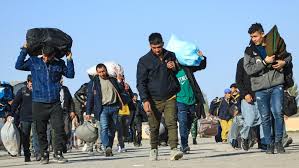Thousands of Afghan nationals are being forced out of Iran in a mass deportation drive. A senior Iranian official has confirmed that over 70 percent of undocumented Afghan migrants are being expelled against their will.
Ahmad Masoumifar, who heads the Foreign Ministry’s office in northeast Iran, said the majority of the recent Afghan deportations were not voluntary. On Monday, June 30, he revealed that during the week from June 22 to June 28—corresponding to the first week of Saratan in the Solar Hijri calendar—about 85,000 undocumented Afghans were deported through the Dogharoun border.
Masoumifar explained that only 25 to 30 percent of Afghan migrants are choosing to return on their own. The rest—nearly three-quarters—are being removed by force. He also mentioned that the pace of Afghan deportations has picked up in advance of a looming deadline.
Iran’s Ministry of Interior has ordered all undocumented foreigners to leave the country by July 6. As that date approaches, the rate of forced returns continues to climb. According to Masoumifar, on June 26 alone, Iran expelled 21,000 Afghans. On June 27 and 28, around 10,000 more were removed in just two days.
He stated that those who choose to go back voluntarily are allowed to carry their personal items with them to the border. Their belongings are then sent into Afghanistan.
His comments, however, conflict with a recent statement by the governor of Taybad. The governor claimed that over 90 percent of Afghan migrants had left Iran willingly. Masoumifar’s remarks tell a different story, showing that most of the Afghan deportations are being carried out under pressure.
Iran has ramped up removals in recent weeks. The sharp increase in expulsions comes amid rising concern from the global community. Human rights groups and aid agencies have warned of the harsh treatment of Afghan refugees and the humanitarian risks tied to mass repatriations.
The latest figures underline the urgency and scale of the crisis. Afghan deportations from Iran are no longer just a policy issue—they are quickly becoming a humanitarian emergency.

